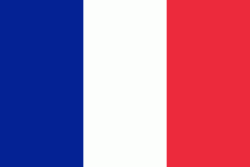Bislama language
Bislama (also known by its earlier French name, bichelamar ) is an English-based creole language and one of the official languages of Vanuatu. It is the first language of many of the "Urban ni-Vanuatu" (citizens who live in Port Vila and Luganville) and the second language of much of the rest of the country's residents. The lyrics of "Yumi, Yumi, Yumi", the country's national anthem, are composed in Bislama.
More than 95% of Bislama words are of English origin, whilst the remainder comprises a few dozen words from French as well as some specific vocabulary inherited from various languages of Vanuatu; though these are essentially limited to flora and fauna terminology. While the influence of these vernacular languages is low on the vocabulary side, it is very high in the morphosyntax. As such, Bislama can be described simply as a language with an English vocabulary and an Oceanic grammar and phonology.
During the period of "blackbirding" in the 1870s and 1880s, hundreds of thousands of Pacific islanders (many of them from the New Hebrides – now the Vanuatu archipelago) were taken as indentured labourers, often kidnapped, and forced to work on plantations, mainly in Queensland, Australia, and Fiji. With several languages being spoken in these plantations a localised pidgin was formed, combining English vocabulary with grammatical structures typical of languages in the region. This early plantation pidgin is the origin not only of Bislama, but also of Tok Pisin in Papua New Guinea, and Pijin of the Solomon Islands; though not of Torres Strait Creole in the north of Australia.
This creole started spreading throughout the Vanuatu archipelago at the turn of the 20th century, as former blackbirds and their descendants began to return to their native islands. Knowledge of this creole would facilitate communication not only with European traders and settlers, but also between native populations, and because Vanuatu is the most language-dense country in the world (one count puts it at 113 languages for a population of 225,000), Bislama usefully serves as a lingua franca for communication between ni-Vanuatu, as well as with and between foreigners. Although it has been primarily a spoken-only language for most of its history, the first dictionary of Bislama was published in 1995. This, along with its second edition in 2004, has helped to create a standardised and uniform spelling of written Bislama.
Besides Bislama, most ni-Vanuatu also know their local language, the local language of their father and/or mother, as well as their spouse, oftentimes. The country's official languages of tuition in schools and educational institutions are English and French.
More than 95% of Bislama words are of English origin, whilst the remainder comprises a few dozen words from French as well as some specific vocabulary inherited from various languages of Vanuatu; though these are essentially limited to flora and fauna terminology. While the influence of these vernacular languages is low on the vocabulary side, it is very high in the morphosyntax. As such, Bislama can be described simply as a language with an English vocabulary and an Oceanic grammar and phonology.
During the period of "blackbirding" in the 1870s and 1880s, hundreds of thousands of Pacific islanders (many of them from the New Hebrides – now the Vanuatu archipelago) were taken as indentured labourers, often kidnapped, and forced to work on plantations, mainly in Queensland, Australia, and Fiji. With several languages being spoken in these plantations a localised pidgin was formed, combining English vocabulary with grammatical structures typical of languages in the region. This early plantation pidgin is the origin not only of Bislama, but also of Tok Pisin in Papua New Guinea, and Pijin of the Solomon Islands; though not of Torres Strait Creole in the north of Australia.
This creole started spreading throughout the Vanuatu archipelago at the turn of the 20th century, as former blackbirds and their descendants began to return to their native islands. Knowledge of this creole would facilitate communication not only with European traders and settlers, but also between native populations, and because Vanuatu is the most language-dense country in the world (one count puts it at 113 languages for a population of 225,000), Bislama usefully serves as a lingua franca for communication between ni-Vanuatu, as well as with and between foreigners. Although it has been primarily a spoken-only language for most of its history, the first dictionary of Bislama was published in 1995. This, along with its second edition in 2004, has helped to create a standardised and uniform spelling of written Bislama.
Besides Bislama, most ni-Vanuatu also know their local language, the local language of their father and/or mother, as well as their spouse, oftentimes. The country's official languages of tuition in schools and educational institutions are English and French.
Country
-
New Hebrides
New Hebrides, officially the New Hebrides Condominium (Condominium des Nouvelles-Hébrides, lit. "Condominium of the New Hebrides") and named after the Hebrides Scottish archipelago, was the colonial name for the island group in the South Pacific Ocean that is now Vanuatu. Native people had inhabited the islands for three thousand years before the first Europeans arrived in 1606 from a Spanish expedition led by Portuguese navigator Pedro Fernandes de Queirós. The islands were colonised by both the British and French in the 18th century, shortly after Captain James Cook visited.
The two countries eventually signed an agreement making the islands an Anglo-French condominium that divided New Hebrides into two separate communities: one Anglophone and one Francophone. That divide continued even after independence, with schools teaching in either one language or the other, and with different political parties. The condominium lasted from 1906 until 1980, when New Hebrides gained its independence as the Republic of Vanuatu.
